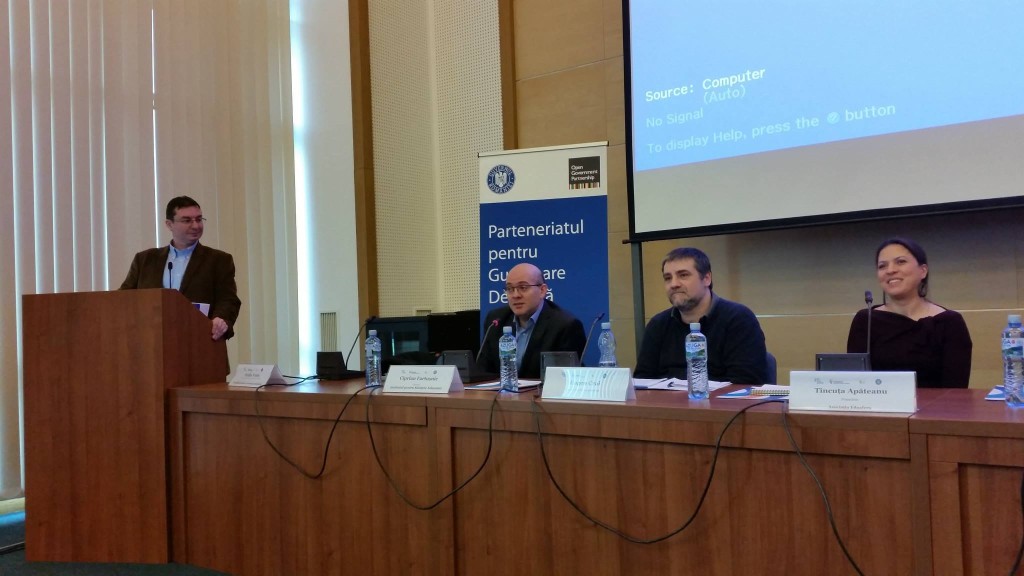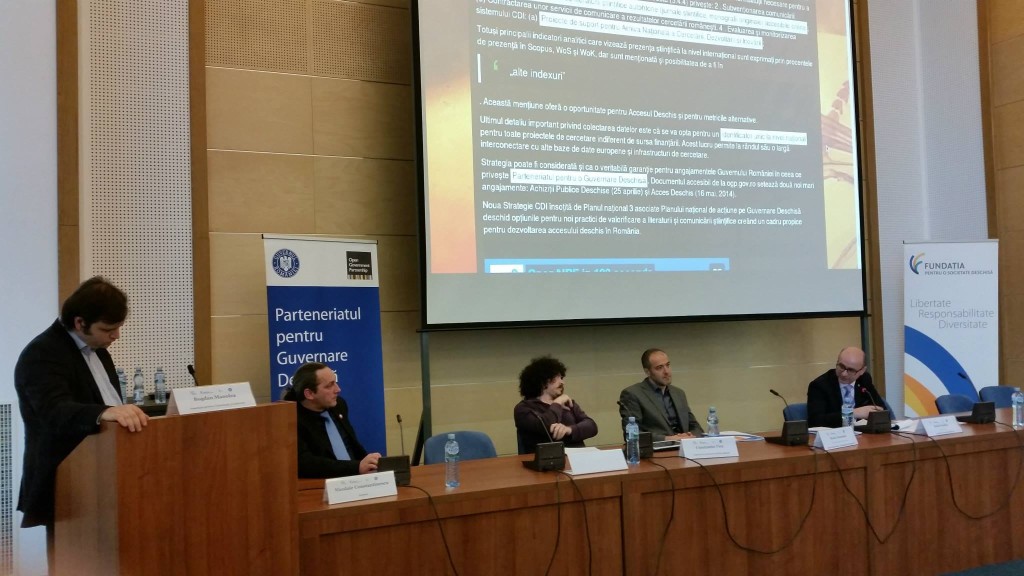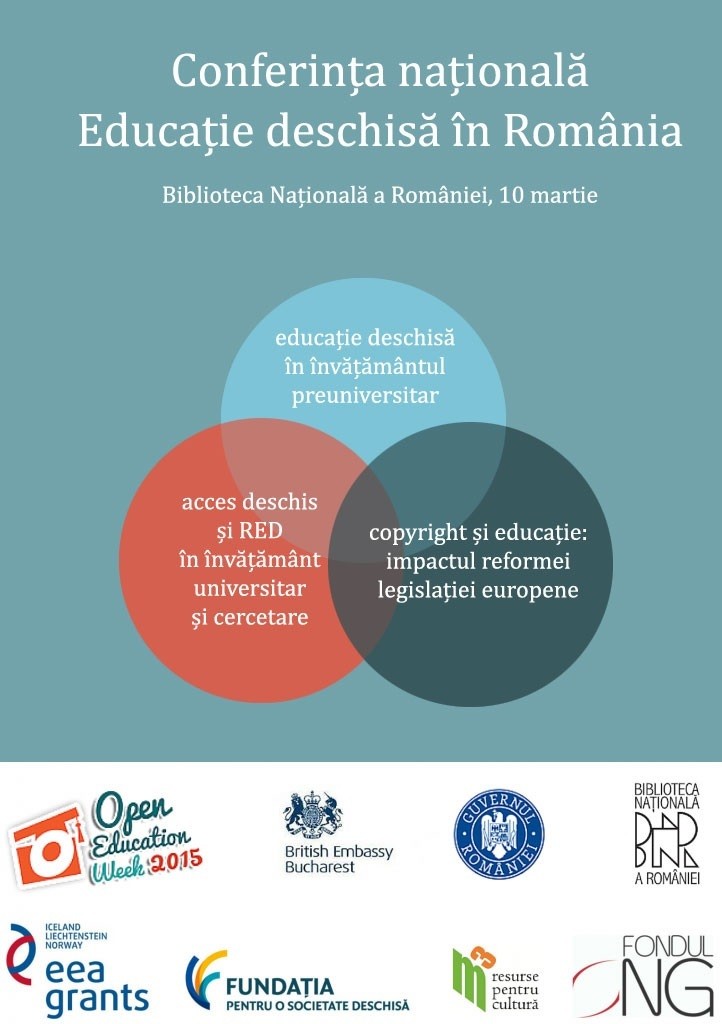Romanian National Open Education Conference
Adelin Dumitru has written a post for us about the second Romanian National Open Education Conference held in Bucharest as part of Open Education Week. The event was organised by the Open Society Foundation and Coalition RED Romania. Adelin works for datedeschise.fundatia.ro, a Romanian platform that hosts information about open data projects, events and news.
***
On 10th of March the Open Society Foundation, endorsed by the Government of Romania and the Embassy of the United Kingdom in Romania organised a Romanian National Open Education Conference in order to reaffirm Romania’s commitment to the principles of open education. This year’s Conference, the second to have taken place in Romania, represents a step forward towards cementing this tradition in a country which lacks a culture of openness, a fact which was reiterated throughout the event by some of the panelists. A full agenda for the day is available in Romanian.
The discussions at the conference mainly focused on harnessing the potential of open educational resources in education and research and on the convoluted problem of copyright and the challenges this issue poses to the Romanian educational system.
An open framework for education in secondary education
Ovidiu Voicu, the Open Society Foundation’s Public Policy Department director, opened discussions in the panel session on ‘An open framework for education in secondary education’ with an intervention in which he emphasised the benefits of open education. He focused on presenting the case for open education as a change of paradigm. An open educational system would purportedly solve some of the pressing problems of the current state of affairs. It would correspond with a permanent enhancement due to its focus on analysis and evaluation, with easing access to education due to its elimination of institutional barriers and with efficiently and transparently employing resources to achieve its ends. This last point is connected to another characteristic of an open educational system, that it is deeply interwoven with technological advances.
Another point he has made is that to enter the open education paradigm would require neither legislative changes nor investments. What is needed, instead, is a change of perspective, which can be accomplished only by conceptually integrating and coordinating the many strategies that currently co-exist but do not interact as they should. Moreover, the open education paradigm does not entail massive investments, though it requires a rethinking of the way we allocate resources.

Panelists: Ciprian Fartuşnic, Director, Institute of Education Sciences; Cristian Dinu, Technical Lead, Co-founder, Learn Forward; Eugen Crai, specialist educational policy; Iosifescu Serban, President ARACIP; Tincuţa Apăteanu, President, Association Edusfera
Although open education is not a panacea, international good practice examples show us that it can have propitious effects, such as increasing educational equity by easing access to educational resources, raising standards and improving quality by promoting peer evaluation, increasing community’s interest in education, stimulating innovation and increasing competition and making investments in education cease to be seen as uncertain, and instead become safer bets.
One particular field where open education effects could be immediately seen is that of online textbooks, which would effectively implement a proposal mentioned in the National Education Law. This makes reference to an online platform which would host open educational resources at a national level. During the conference this was contrasted with the actual online textbooks, which are neither open source nor legally open, since they do not have any associated license. This makes things complicated for authors, since the lack of a specified legal status represents a disincentive for improving upon the existing textbooks. Another proposal in the spirit of open education would be increasing transparency and integrity of educational institutions. This could be done by publishing budgets and by ensuring that consulting procedures are respected by the Ministry of Education.
Interventions from the public have brought up some interesting aspects, such as the fact that parents may be those who oppose change and who pose threats to the shift to an open education paradigm. The conclusion that has been drawn was that teachers should be those to educate not only children, but also parents, presenting the advantages of open education and trying to reduce their incredulity in alternatives to traditional textbooks, for instance. One participant has mentioned that textbooks represent anchors for parents, which preclude them from seeing the real benefits of reforms. Such issues will have to be dealt with if we want a paradigm shift.
Open access and OER in higher education and research
The second panel session focused on open access and open educational resources in high education and research. Nicolaie Constantinescu of Kosson explained to the public concepts such as open access, open resources, licenses, and shed some light on misconceptions associated with these concepts. He elaborated on the history of open education in Romania, focusing on open access via data bases. Radu Atanasiu, Adjunct Lecturer of Critical Thinking at the Maastricht School of Management Romania highlighted the utility of Massive Online Open Courses (MooCs) and also their hidden potential which could be tapped in the future by Romanian scholars and students. Constantin Vică, from the Research Centre in Applied Ethics, talked about the problems encountered by researchers in accessing data, and also about the difficult state of Romanian journals in the context of globalization of knowledge and keeping up with international household names.

Panelists: Nicolae Constantinescu, Kosson; Marius Nicolăescu CIO Executive Unit for Financing Higher Education, Research, Development and Innovation; Puchiu Radu, State Secretary, Prime Minister’s Office; Radu Atanasiu, Adjunct Lecturer of Critical Thinking, Maastricht School of Management Romania; Constantin Vică, Center for Research in Applied Ethics
The last panel session represented an extensive debate on copyright and education. There have been put forward two perspectives, one promoting a relaxation of copyright and the other supporting a better enforcement of copyright. While the latter represents the dominant perspective, the debate has shown that the counterarguments should not be easily dismissed. The Analysis Report of the EU legislation, realized by Julia Reda, Member of the European Parliament, has been presented as the main case against copyright protection. Contentious topics such as the status of orphan works have been brought up, proving the numerous lines that can be opened by such a discussion, benefiting from a framework that reunited specialists and practitioners in the field. One proposal has been that the Ministry of Education should put at the public’s disposal digital textbooks in workable formats, without restrictions on their usage, according to the principle “any resource produced with public money shall have open access“.
Conclusions
All in all, the Romanian National Open Education Conference gathered 130 participants, among these professors, inspectors, scholars, representatives of the government, of student associations, of non-governmental organizations. An increased interest can be noticed in comparison to last year’s edition, the number of participants almost doubling, proving that, to a certain extent, the Romanian public has become more intent to learn about open educational resources. This could be a harbinger that the aforementioned paradigm shift is due to happen at one point or another, and it is through events like these that the public becomes informed and from this awareness can emerge the necessary reforms and the necessary change of perspective on education, transparency and integration.
More details about the event are available from the datedeschise.fundatia.ro website in Romanian.
 Open Education Working Group
Open Education Working Group 




Leave a Reply